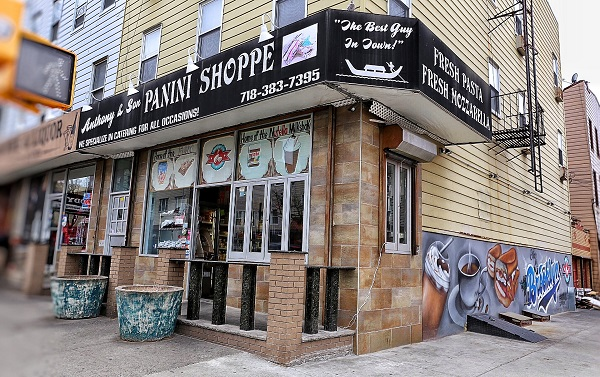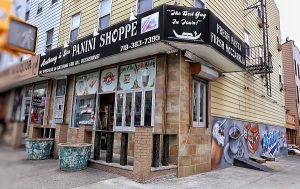
Written By: Olivia McCaa

weather out COVID-19. / Food’n’Festivities
As Brooklyn College reaches its one-year mark since shutting down amidst the global pandemic, neighboring Brooklyn businesses continue to face difficulties and instability as the city begins to announce their vaccine rollouts and promises of more normality. Many businesses saw themselves making difficult decisions to support their employees and community.
“We were very scared,” an anonymous employee from Berlines Unisex Beauty Salon told the Vanguard, “The world was panicking and scrambling around and I quit for nearly four months.”
Berlines Unisex Beauty Salon, just a ten minute walk from campus, found themselves in a difficult position over the year. “I think I lost so many customers, and none of them came back. It’s difficult, and we are relying on this vaccine in the hope people may come back,” they said.
Employers and employees found themselves in a complicated situation trying to ensure they could provide for themselves and their families. Although many businesses did struggle to transition to an online and take-out service, some restaurants found themselves at an advantage.
Footprints Cafe Express, a local Flatbush restaurant was already prepared for the massive changes and regulations put in place by the CDC.
“Basically for us in terms of this location it kind of played into our hands” explained Rachael Poyotte, the Executive and Admin Assistant of Footprints Cafe Express, “because according to the guidelines and regulations set by New York and the CDC for closing the indoor restaurant service and operating more of a take out service, we already had been prepared for that type of service.” Footprints had been serving their customers on both their own and with third-party delivery sites for the entirety of their seven years in Flatbush. Nonetheless, they face some financial hardships.
“As much as we are currently thriving, it’s killing us. It mainly has to do with the measures that need to be implemented which are costly. We would like at some point to be making back instead of putting out,” Poyotte said.
When it comes to serving their community, local businesses understood that adjustments were necessary for the health and safety of their workers and customers.
“We provide proper materials for cleaning like PPE, taking temperature, contact tracing, and those who did not feel comfortable coming in were allowed to stay home,” comments Poyotte.
Early on in the initial stages of the pandemic and lockdown, many businesses like Marine Park Coffee had to cut down their staff. “We made the difficult decision to temporarily furlough our employees until we could safely rehire them,” said owner John Thomassen. This allowed his employees to remain at home and gain the benefits from the early stimulus package.
Thomassen took on the big responsibility of being the shop’s sole worker for nearly a month to remain afloat and keep Coffee’s doors open to give “a sense of normalcy to our neighbors who were stuck at home and provided some revenue to cover rent and utilities.”
Now nearly a year later, Marine Park Coffee was able to rehire back all of their employees who wanted to return.
Cafe Grumpy in South Slope Brooklyn faced similar challenges, and were forced to close in order to keep people on the payroll. Caroline Bell, Grumpy’s founder and CEO, explained that because things are still slow in NYC, they had to permanently shutdown one location in Manhattan, and temporarily close a few others. However, Bell is optimistic for New York’s recovery.
“We hope that New York will regain its vibrancy and that office workers and tourists will come back into the city so that small businesses that rely on those people to survive will be able to maintain a presence,” she said. With effort and daily work, Cafe Grumpy’s locations in New York have begun to slowly reopen.
As spring approaches and the winter season ends, businesses are hopeful for more customers and foot traffic to occur. For businesses like Peaches Hothouse in Bedford, run by owners Ben Grossman and Craig Samuel, they noticed that although their overall topline revenue had not recovered to their previous pre-pandemic times, they are still able to get by.
“(…)We have been able to make it work to be a business that can pay our team members, pay our vendors and suppliers, and support our community and be an important beacon of hope during this difficult time for all,” Grossman and Craig stated in an email to Vanguard.
Although Grossman and Samuel’s business had seen a decline, they understood that this was a new normal for a while and focused on how they could continue to give back. Their efforts were able to provide over 50,000 meals for first responders and those in need.
“It is how we have always operated and how we will continue to operate after this pandemic,” they stated.
Despite the challenges they face as the pandemic continues, many local Brooklyn businesses are grateful for both their loyal regulars and new customers who’ve supported them through it all.
“There are people that have lost everything,” said Sabino Curcio of Anthony and Sons Panini Shoppe on Graham Avenue. “So we are truly grateful and blessed that we have been able to remain open the whole time.”
With vaccines steadily rolling out, local businesses have become more optimistic for the future of their shops and their community. “Just stop by another shop or us and visit,” Curcio says, “Allow and trust in your community and us to support you.”
